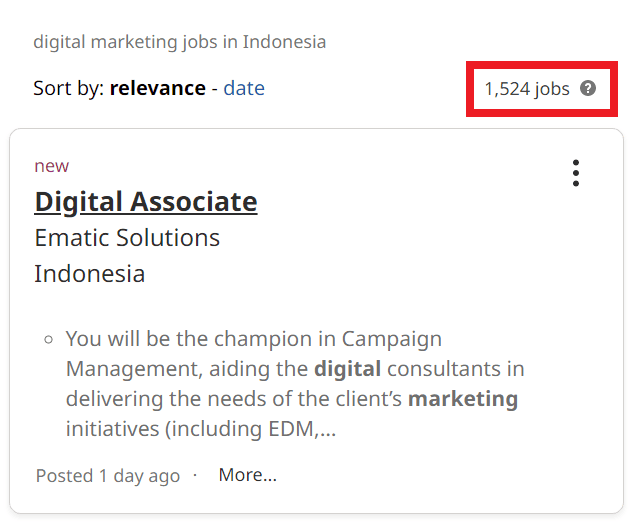Factors That Affect Your Digital Marketing Salary:
In today’s rapidly evolving digital landscape, digital marketing has become an indispensable field for businesses. As more organizations recognize the importance of establishing a robust online presence, the demand for skilled digital marketers continues to rise. If you’re considering a career in digital marketing or are already in the field, it’s essential for you to understand the factors that can influence your salary. Here are the top 8 factors that can significantly impact your digital marketing salary in Ciampea.
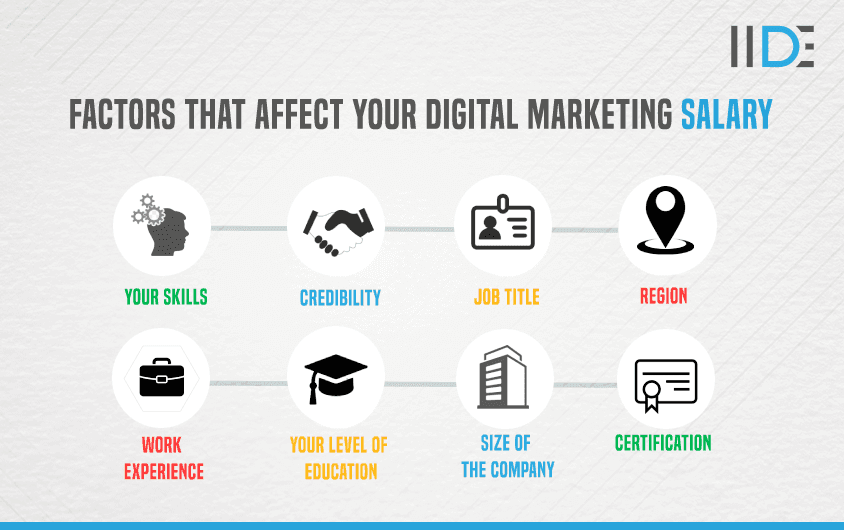
1. Work Experience
One of the most crucial factors influencing your digital marketing salary is your work experience. Similar to other professions, having more experience increases your potential earnings in the field of digital marketing. Employers value candidates who possess a track record of successful campaigns, demonstrated expertise in various digital marketing channels, and the ability to deliver tangible results. By continually expanding your skills and accumulating relevant experience, you can position yourself for higher-paying roles within the industry.
2. Credibility
Establishing credibility in the digital marketing field can significantly impact your salary. Building a strong personal brand, cultivating a robust professional network, as well as gaining recognition for your expertise through thought leadership and industry contributions are all essential steps toward enhancing your credibility. A reputable reputation can make you an attractive candidate for high-paying digital marketing positions while increasing your earning potential.
3. Job Title
Your job title within the digital marketing field can significantly influence your salary. Different roles within the industry come with varying levels of responsibility, specialization, and corresponding compensation packages. Positions such as Digital Marketing Manager, SEO Specialist, Content Strategist, and Social Media Manager often command higher salaries due to their increased complexity and leadership responsibilities. It’s important to aim for job titles that align with your career goals and offer the financial rewards you desire.
4. Region
The geographical location in which you work can significantly impact your digital marketing salary. Salaries can vary based on regional factors such as the cost of living, market demand, and local industry standards. For instance, digital marketers working in major metropolitan areas or tech hubs may earn higher salaries compared to those in smaller cities or rural areas. Researching salary ranges specific to your region can help you gain a better understanding of the earning potential in your area.
5. Size of the Company
The size of the company you work for can also affect your digital marketing salary. Larger organizations with substantial marketing budgets and complex digital marketing strategies often offer higher salaries to attract top talent. On the other hand, smaller companies or startups may have more limited resources and may offer lower salaries in comparison. However, smaller companies often provide opportunities for career growth, hands-on experience, as well as the chance to make a significant impact in a shorter period, which can be valuable for your long-term career prospects.
6. Your Level of Education
While a degree is not always a requirement in the digital marketing field, your level of education can still influence your earning potential. A higher level of education such as a bachelor’s or master’s degree in marketing or a related field can demonstrate a deeper understanding of marketing principles, strategic thinking, and analytical skills. Employers may be more inclined to offer higher salaries to candidates with advanced degrees due to the perceived value of their educational background.
7. Certification
Digital marketing certifications can play a vital role in boosting your salary. Certifications such as IIDE, Google Ads, Google Analytics, HubSpot, or Facebook Blueprint, showcase your specialized skills and knowledge in specific areas of digital marketing. Employers often value these certifications as proof of your expertise and dedication to staying updated in a rapidly evolving field. Obtaining relevant certifications can not only increase your earning potential but also provide a competitive advantage in the job market.
8. Your Skills
Last but certainly not least, your specific skills in digital marketing can significantly impact your salary. Proficiency in key digital marketing skills such as search engine optimization (SEO), pay-per-click (PPC) advertising, content marketing, social media management, data analytics, and email marketing can make you a highly sought-after professional. Employers recognize the value of individuals who possess a diverse skill set and can effectively navigate multiple digital marketing channels. The more specialized and in-demand skills you possess, the higher your earning potential in the field.
To enhance your digital marketing skills and boost your career prospects, consider enrolling in IIDE’s short-term certificate courses. IIDE offers a wide range of comprehensive courses designed to equip you with the latest industry knowledge and practical skills required to thrive in the digital marketing landscape. Whether you’re a beginner or an experienced professional, these courses cater to all skill levels and cover various specializations such as SEO, PPC, social media marketing, content marketing, and more. So don’t miss out on the opportunity to upskill and unlock your full potential in the digital marketing field.
Also, check out this video by Karan Shah, the founder, and CEO of IIDE for an overview of the top six highly sought-after digital marketing skills to safeguard your career in today’s digital landscape.
Digital Marketing Salary in Ciampea (Digital Marketing Jobs That Come With A High-paying Salary):
Some of the digital marketing jobs that come with a high-paying salary in Ciampea are as follows:
1. CopyWriter
A copywriter plays a crucial role in digital marketing by creating compelling as well as persuasive written content. They craft engaging copy for various channels such as websites, social media, email campaigns, and advertisements. A skilled copywriter understands how to captivate the target audience, convey brand messaging effectively, as well as drive desired actions. With their ability to craft persuasive narratives and optimize content for search engines, experienced copywriters often command high-paying salaries in the digital marketing industry.
Salary of a CopyWriter
As per Salary Explorer’s report, a CopyWriter’s average salary in Indonesia, including Ciampea, can vary from IDR 4,960,000 to IDR 12,400,000 based on their level of experience.
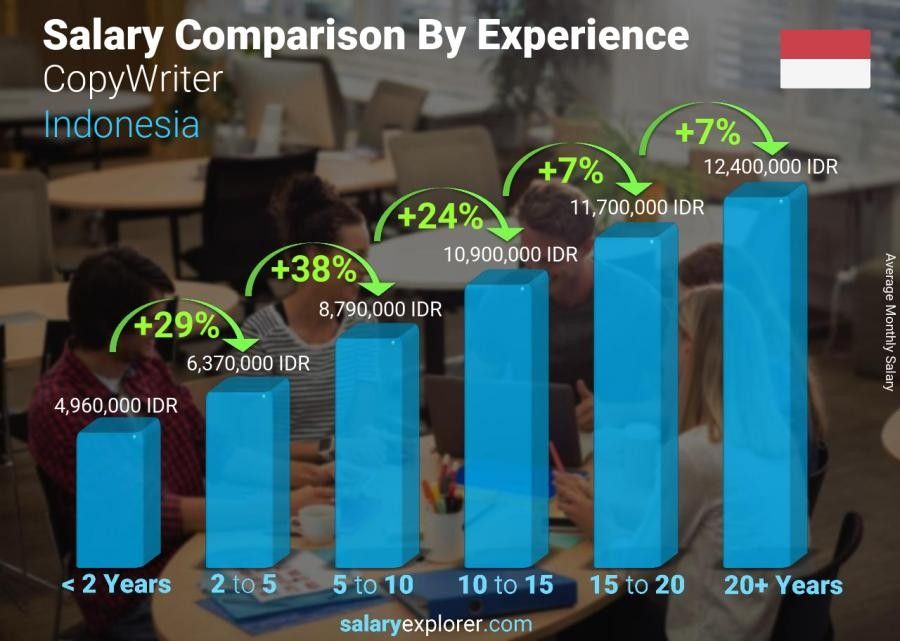
Source: salaryexplorer.com
Key Responsibility of a CopyWriter
- Develop compelling and creative copy for various marketing and advertising materials.
- Collaborate with the marketing team to understand campaign objectives and develop effective messaging strategies.
- Write and edit copy for digital platforms, including websites, social media, emails, and online ads.
- Create persuasive and engaging headlines, taglines, and slogans.
- Ensure that all copy is grammatically correct, adheres to brand guidelines, and meets the organization’s tone and voice requirements.
- Optimize copy for search engine optimization (SEO) to increase online visibility and drive organic traffic.
- Conduct A/B testing and analyze performance metrics to optimize copy and improve conversion rates.
- Develop persuasive sales scripts and presentations for sales teams.
2. E-commerce Manager
As e-commerce continues to thrive, the role of an e-commerce manager has become increasingly significant. E-commerce managers oversee online sales channels, optimize product listings, and implement strategies to drive revenue growth. They are responsible for managing website functionality, coordinating with marketing teams, analyzing data, and improving the overall online shopping experience. Given the critical role they play in driving online sales, e-commerce managers are in high demand these days and their expertise is rewarded with attractive salaries.
Salary of an E-commerce Manager
As per Salary Explorer’s report, an E-commerce Manager’s average salary in Indonesia, including Ciampea, can vary from IDR 7,890,000 to IDR 22,400,000 based on their level of experience.
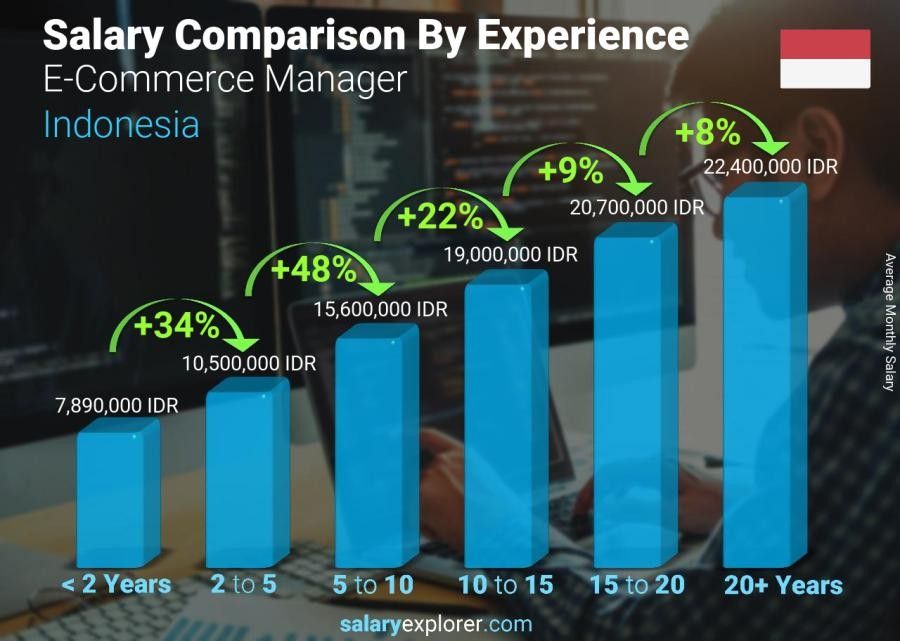
Source: salaryexplorer.com
Key Responsibility of an E-commerce Manager
- Develop and implement overall e-commerce strategy and goals.
- Drive revenue growth by optimizing the online sales channels.
- Conduct market research and monitor industry trends to identify opportunities and challenges.
- Manage the e-commerce website, ensuring its functionality, user experience, and performance.
- Oversee the online product catalog, including product listings, descriptions, and pricing.
- Coordinate with the marketing team to create and execute digital marketing campaigns.
- Utilize SEO techniques to improve search engine rankings and increase organic traffic.
- Manage online advertising campaigns, such as pay-per-click (PPC) and display ads.
- Monitor and analyze key performance indicators (KPIs) to assess the effectiveness of e-commerce initiatives.
- Optimize the conversion funnel to maximize sales and improve customer experience.
- Implement and manage online promotions, discounts, and customer loyalty programs.
- Collaborate with the IT department to ensure the security and stability of the e-commerce platform.
3. Search Engine Optimization (SEO) Manager
With the growing importance of search engine visibility, SEO managers are integral to digital marketing success. These professionals possess in-depth knowledge of search engine algorithms and use it to optimize websites and content to achieve higher organic search rankings. They conduct keyword research, analyze website performance, implement on-page and off-page optimization techniques, and monitor SEO metrics. Due to the value they bring in driving organic traffic and improving search visibility, SEO managers often enjoy well-compensated positions.
Salary of an SEO Manager
As per Salary Explorer’s report, an SEO Manager’s average salary in Indonesia, including Ciampea, can vary from IDR 8,270,000 to IDR 22,100,000 based on their level of experience.
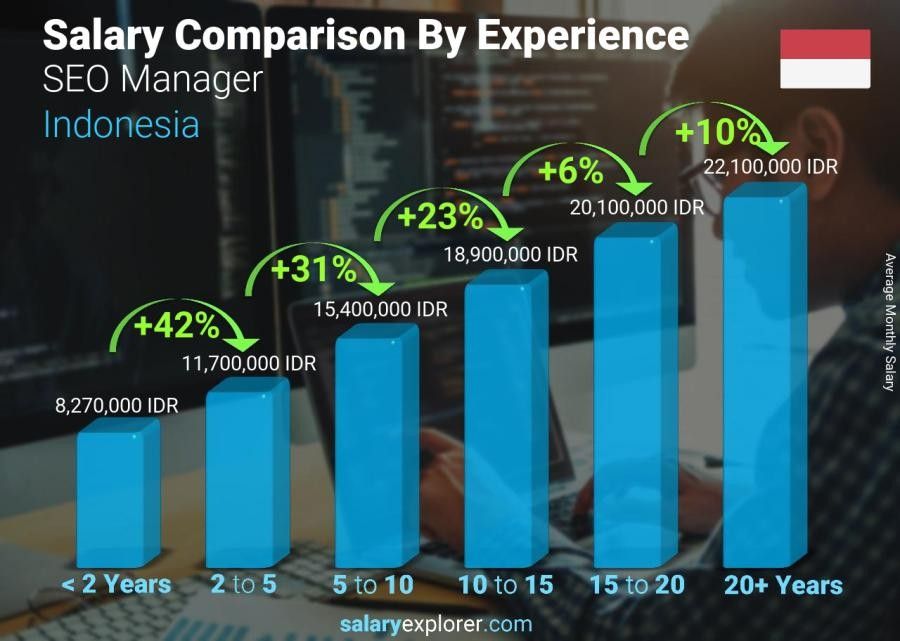
Source: salaryexplorer.com
Key Responsibility of an SEO Manager
- Develop and implement an SEO strategy to improve organic search rankings and drive traffic to the website.
- Conduct keyword research and analysis to identify valuable opportunities and optimize website content accordingly.
- Monitor and analyze website performance using SEO tools and analytics platforms, such as Google Analytics, to identify areas for improvement.
- Stay up to date with search engine algorithm changes and industry trends, and adjust SEO strategies accordingly.
- Optimize website structure, navigation, and internal linking to enhance user experience and search engine crawlability.
- Collaborate with content creators and marketers to ensure that content is optimized for search engines and aligns with the overall SEO strategy.
- Conduct competitive analysis to identify strengths, weaknesses, and opportunities in the search landscape.
- Perform technical SEO audits to identify and resolve issues that may impact search engine visibility and website performance.
4. Content Marketing Strategist
Content marketing strategists play a vital role in creating and executing content marketing campaigns. They develop comprehensive content strategies, identify target audiences, as well as craft engaging content across various platforms. These professionals are skilled in understanding user intent, conducting content audits, analyzing data, and managing content distribution. A content marketing strategist who can demonstrate measurable results and contribute to brand growth through effective content often commands a high-paying salary.
Salary of a Content Marketing Strategist
As per Salary Explorer’s report, a Content Marketing Strategist’s average salary in Indonesia, including Ciampea, can vary from IDR 8,070,000 to IDR 19,700,000 based on their level of experience.
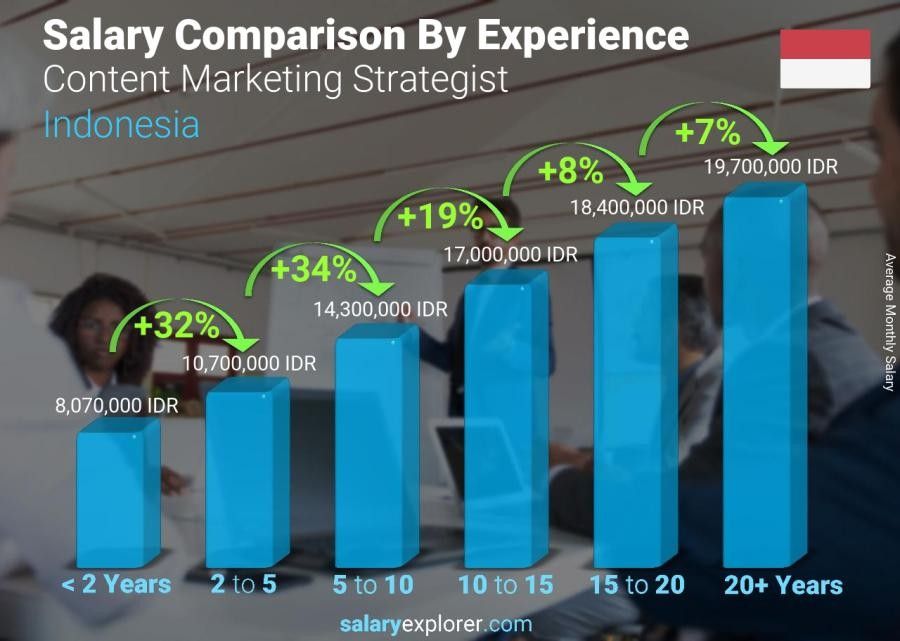
Source: salaryexplorer.com
Key Responsibility of a Content Marketing Strategist
- Developing and executing content marketing strategies to drive brand awareness, engagement, and lead generation.
- Conducting market research and analyzing industry trends to identify content opportunities and target audience preferences.
- Creating and managing a content calendar to ensure consistent delivery of high-quality content across various platforms.
- Collaborating with cross-functional teams (such as marketing, design, and sales) to align content strategies with overall business objectives.
- Defining target audience personas and developing content tailored to their needs, interests, and pain points.
- Conducting competitor analysis to identify content gaps and opportunities for differentiation.
- Planning and overseeing the production of various content types, including blog posts, articles, videos, infographics, case studies, whitepapers, and social media posts.
- Optimizing content for search engines (SEO) to improve organic visibility and website traffic.
- Utilizing analytics tools to track and measure content performance, making data-driven decisions for continuous improvement.
5. Web Developer
Web developers are responsible for designing and developing websites that are visually appealing, user-friendly, as well as perfectly optimized for performance. They possess expertise in coding languages such as HTML, CSS, JavaScript, and PHP and work closely with designers and marketers to bring website concepts to life. Web developers who can create seamless user experiences, implement responsive designs, and optimize website speed and performance are highly sought-after in the digital marketing industry, often leading to well-remunerated positions.
Salary of a Web Developer
As per Salary Explorer’s report, a web developer’s average salary in Indonesia, including Ciampea, can vary from IDR 5,840,000 to IDR 16,600,000 based on their level of experience.
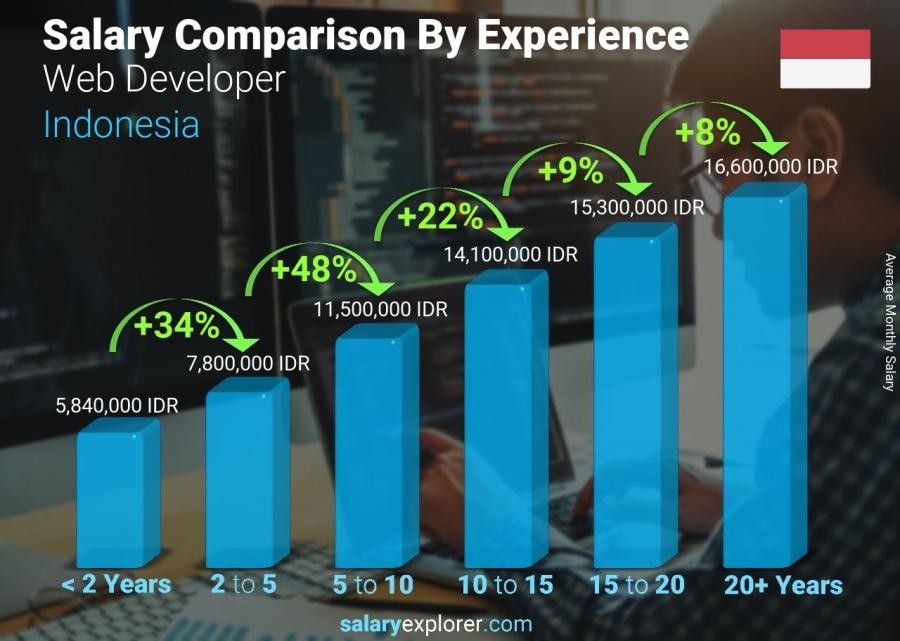
Source: salaryexplorer.com
Key Responsibility of a Web Developer
- Writing clean, efficient, and scalable code using programming languages such as HTML, CSS, JavaScript, and others.
- Collaborating with designers, project managers, and other team members to understand project requirements and objectives.
- Translating design mockups and wireframes into functional websites or web applications.
- Implementing responsive design principles to ensure optimal user experience across different devices and screen sizes.
- Testing websites and web applications for cross-browser compatibility and responsiveness.
- Optimizing website performance and speed through code optimization and caching techniques.
- Integrating third-party tools, libraries, and APIs to enhance website functionality.
- Implementing and maintaining database structures and integrating them into web applications.
- Implementing security measures to protect websites against common web vulnerabilities.
- Staying up to date with emerging web technologies, frameworks, and best practices.
6. Digital Marketing Strategist
Digital marketing strategists are responsible for developing and executing comprehensive digital marketing campaigns. They analyze market trends, identify target audiences, and create strategies to maximize brand visibility and engagement. Digital marketing strategists possess a deep understanding of various digital channels such as social media, search engine marketing, email marketing, and content marketing. Their ability to create effective and data-driven strategies that drive business growth often leads to lucrative salary packages.
Salary of a Digital Marketing Strategist
As per Salary Explorer’s report, a Digital Marketing Strategist’s average salary in Indonesia, including Ciampea, can vary from IDR 10,900,000 to IDR 25,200,000 based on their level of experience.
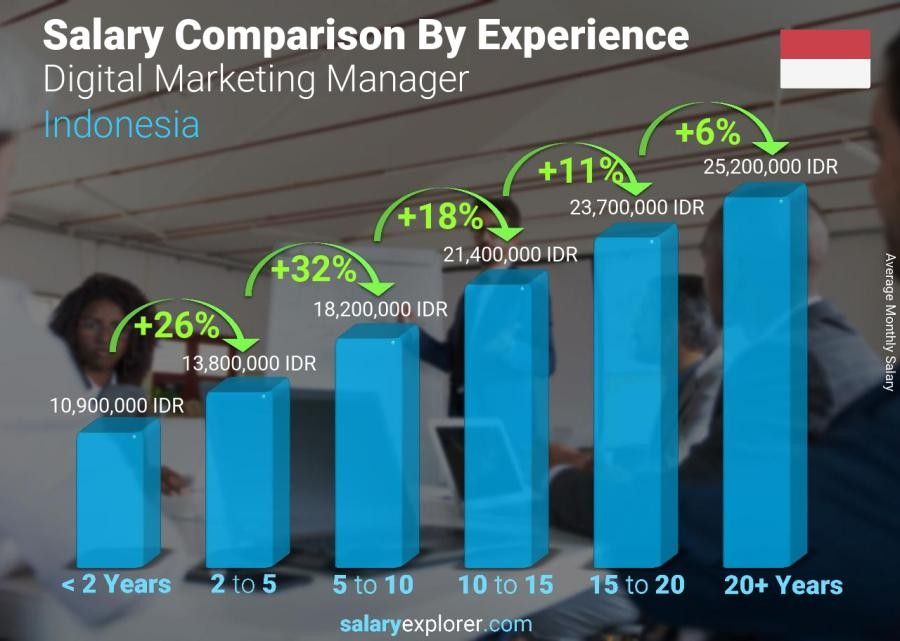
Source: salaryexplorer.com
Key Responsibility of a Digital Marketing Strategist
- Developing and implementing comprehensive digital marketing strategies aligned with the overall marketing objectives.
- Conducting market research and competitor analysis to identify target audiences, market trends, and opportunities.
- Creating and managing digital marketing campaigns across various channels, such as search engines, social media, email, display advertising, etc.
- Setting clear campaign goals, KPIs (Key Performance Indicators), and measuring campaign performance using analytics tools.
- Optimizing digital campaigns to maximize ROI (Return on Investment) and achieve desired outcomes.
- Managing and allocating digital marketing budgets effectively to achieve optimal results.
- Collaborating with cross-functional teams, including designers, content creators, and developers, to ensure campaign alignment and seamless execution.
- Developing and implementing content marketing strategies to drive engagement, brand awareness, and lead generation.
- Utilizing SEO (Search Engine Optimization) techniques to improve organic search visibility and website traffic.
7. Creative Director
Creative directors play a pivotal role in shaping the visual as well as creative aspects of digital marketing campaigns. They provide strategic direction, oversee the creative team, and ensure that campaigns align with the brand’s vision and objectives. Creative directors possess a keen eye for design, storytelling, and brand aesthetics. They collaborate with copywriters, graphic designers, as well as other creatives to produce visually compelling and impactful digital content. Due to their creative expertise and leadership, creative directors often earn high salaries in the digital marketing industry.
Salary of a Creative Director
As per Salary Explorer’s report, a Creative Director’s average salary in Indonesia, including Ciampea, can vary from IDR 6,790,000 to IDR 18,700,000 based on their level of experience.
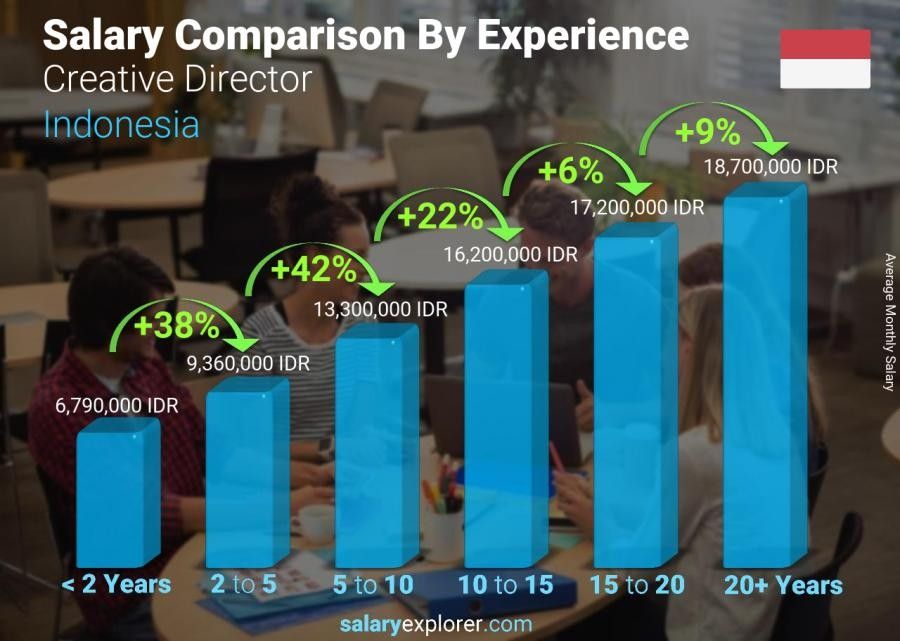
Source: salaryexplorer.com
Key Responsibility of a Creative Director
- Developing and implementing creative strategies and concepts for marketing campaigns, branding initiatives, and other creative projects.
- Leading and managing a team of designers, copywriters, and other creative professionals to ensure high-quality and innovative work.
- Providing creative direction and guidance to the team, including setting the overall artistic vision and standards.
- Collaborating with clients, stakeholders, and other departments to understand project objectives and deliver creative solutions that meet their needs.
- Conducting research and staying updated on industry trends, consumer insights, and competitors to inform creative decisions.
- Presenting and pitching creative ideas and concepts to clients or senior management, effectively communicating the vision and rationale behind the proposed solutions.
- Overseeing the entire creative process, from concept development to final execution, ensuring adherence to timelines, budgets, and quality standards.
- Reviewing and providing feedback on creative deliverables, ensuring they align with the project objectives and brand guidelines.
- Mentoring and coaching team members, fostering their professional growth and development.
8. Digital Marketing Manager
Digital marketing managers are responsible for overseeing all aspects of a company’s digital marketing efforts. They develop and implement marketing strategies, manage budgets, coordinate with cross-functional teams, as well as analyze campaign performance. Digital marketing managers possess a broad understanding of various digital channels and are skilled in leveraging them to drive brand awareness, customer acquisition, and revenue growth. Given the level of responsibility and strategic oversight, digital marketing managers often enjoy competitive compensation packages.
Salary of a Digital Marketing Manager
As per Salary Explorer’s report, a Digital Marketing Manager’s average salary in Indonesia, including Ciampea, can vary from IDR 10,900,000 to IDR 25,200,000 based on their level of experience.
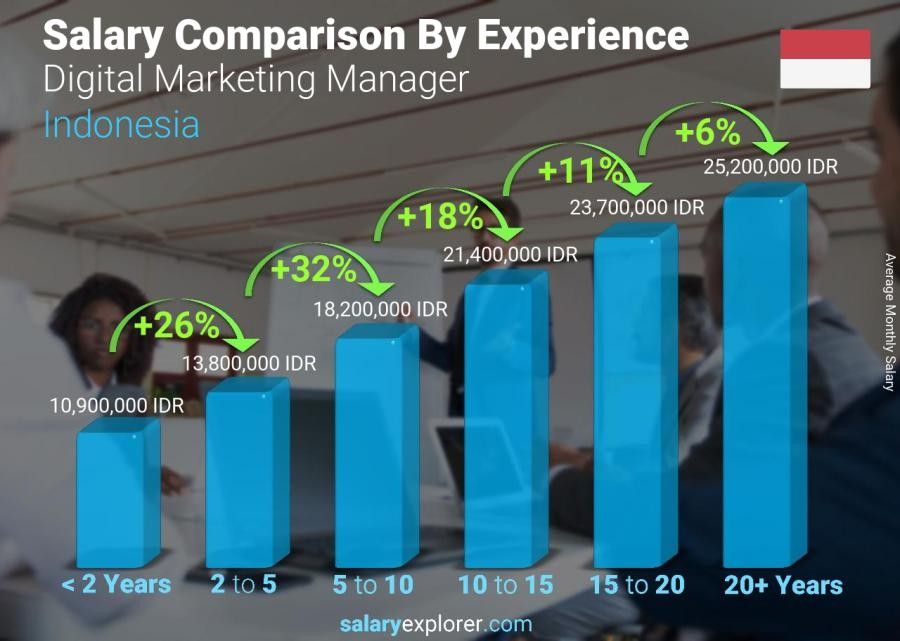
Source: salaryexplorer.com
Key Responsibility of a Digital Marketing Manager
- Planning and managing digital advertising campaigns across various platforms (e.g., Google Ads, social media advertising, display advertising).
- Conducting market research and competitor analysis to identify trends, opportunities, and target audience behavior.
- Managing and optimizing the organization’s website and landing pages for search engine visibility (SEO) and user experience.
- Analyzing website traffic and user behavior using tools like Google Analytics to identify areas for improvement and optimize conversion rates.
- Creating and managing content marketing initiatives, including blog posts, social media content, email campaigns, and video marketing.
- Developing and executing social media strategies to build brand awareness, engage with the target audience, and drive traffic to the website.
- Monitoring and managing online brand reputation through proactive online reputation management strategies.
- Managing and growing the organization’s email marketing database and executing effective email marketing campaigns.
9. Social Media Specialist
Social media specialists are experts in managing and optimizing a brand’s presence on social media platforms. They develop social media strategies, create engaging content, monitor social media trends, as well as interact with the audience. Social media specialists understand how to leverage social media algorithms, utilize paid advertising, as well as engage in community management. Their ability to drive brand awareness, engagement, and conversions through social media often translates into well-paid positions.
Salary of a Social Media Specialist
As per Salary Explorer’s report, a Social Media Specialist’s average salary in Indonesia, including Ciampea, can vary from IDR 7,130,000 to IDR 17,900,000 based on their level of experience.
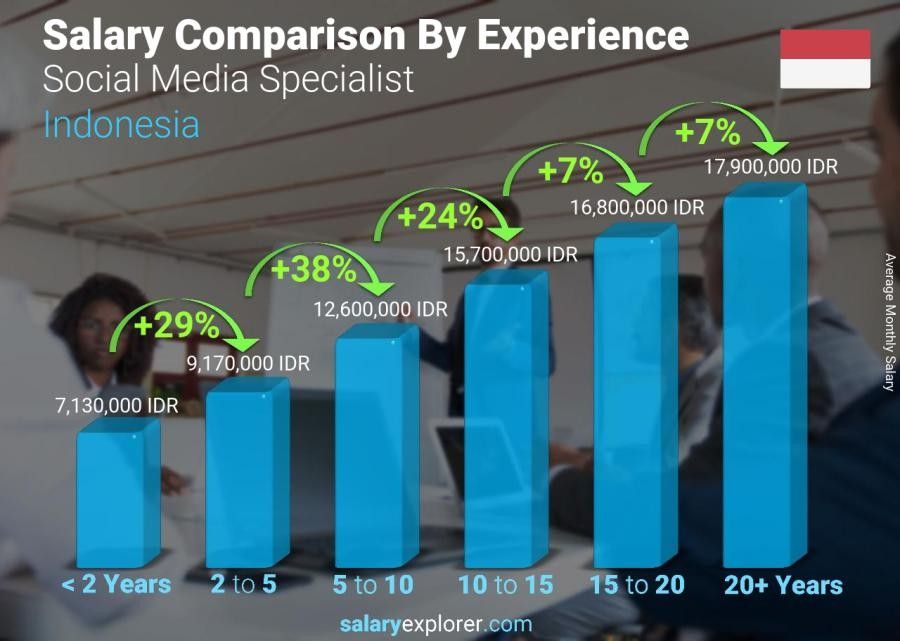
Source: salaryexplorer.com
Key Responsibility of a Social Media Specialist
- Creating and curating compelling content for social media platforms such as Facebook, Instagram, Twitter, LinkedIn, etc.
- Managing social media accounts, including posting updates, monitoring activity, and responding to comments and messages.
- Implementing social media advertising campaigns to increase reach, conversions, and audience targeting.
- Conducting research and staying up to date with social media trends, best practices, and emerging platforms.
- Monitoring and analyzing social media metrics and performance using analytics tools to identify opportunities for improvement.
- Collaborating with cross-functional teams, such as marketing, design, and content, to align social media strategies with overall brand goals.
- Engaging with social media influencers and building partnerships to amplify brand reach and awareness.
- Monitoring industry trends and competitor activities on social media to identify potential opportunities and strategies.
10. Market Research Manager
Market research managers play a crucial role in helping businesses understand their target audience, market trends, and competitive landscape. They design and implement market research studies, analyze data, and provide actionable insights to inform marketing strategies. Market research managers use various methodologies such as surveys, focus groups, and data analysis to gather consumer insights as well s assess market opportunities. Due to their ability to guide data-driven decision-making and shape effective marketing strategies, market research managers are often rewarded with high-paying positions.
Salary of a Market Research Manager
As per Salary Explorer’s report, a Market Research Manager’s average salary in Indonesia, including Ciampea, can vary from IDR 9,390,000 to IDR 23,000,000 based on their level of experience.
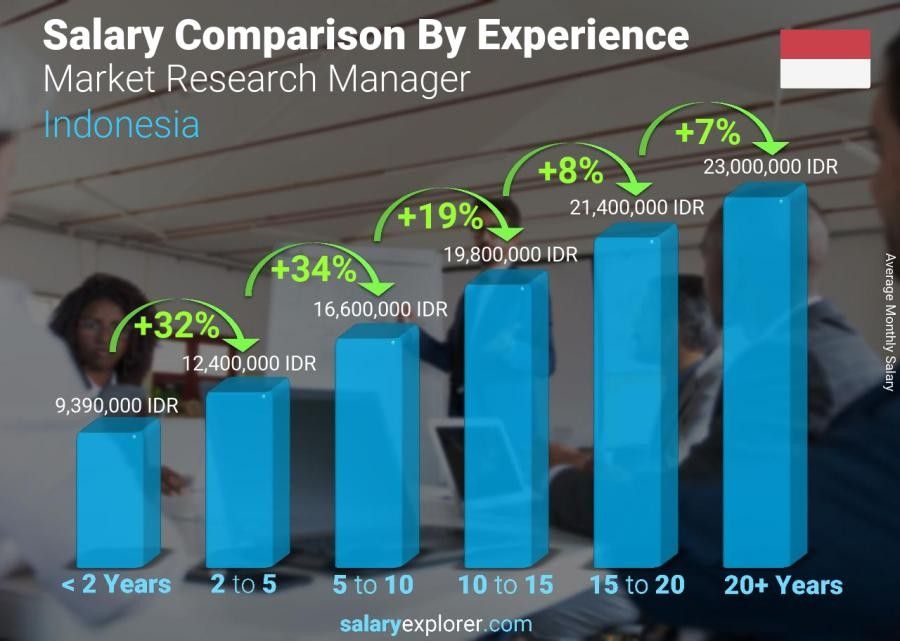
Source: salaryexplorer.com
Key Responsibility of a Market Research Manager
- Designing and implementing market research studies to gather relevant data and insights.
- Developing research objectives, methodologies, and survey/questionnaire designs.
- Identifying and defining target market segments and conducting market segmentation studies.
- Collecting data through various research methods, such as surveys, interviews, focus groups, and observational studies.
- Analyzing quantitative and qualitative data to extract meaningful insights and trends.
- Interpreting research findings and presenting them to stakeholders in a clear and concise manner.
- Conducting competitive analysis to identify market trends, competitors’ strategies, and industry benchmarks.
- Monitoring and tracking market trends, consumer behavior, and industry developments.
- Identifying and assessing new market opportunities and potential target segments.

